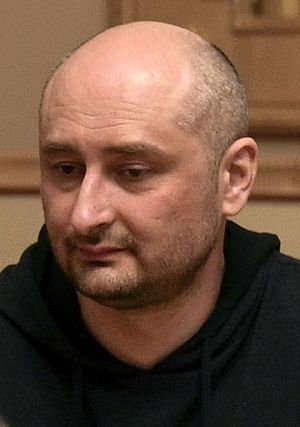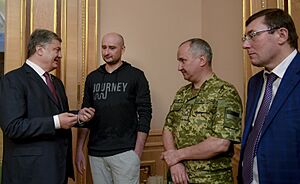Arkady Babchenko facts for kids
Quick facts for kids
Arkady Babchenko
|
|
|---|---|

Babchenko in 2018
|
|
| Born | Arkady Arkadyevich Babchenko 18 March 1977 Moscow, Russian SFSR, USSR |
| Occupation | Journalist |
| Language | Russian |
| Nationality | Russian |
| Notable works | One Soldier's War (2006) |
| Children | 7 (6 adopted) |
Arkady Arkadyevich Babchenko (Russian: Аркадий Аркадьевич Бабченко) was born on March 18, 1977. He is a journalist from Russia who works in print and television.
Babchenko served in the Russian army during the First Chechen War starting in 1995. He later volunteered for six months in the Second Chechen War. After leaving the army in 2000, he became a war correspondent. This means he reported on conflicts from the places where they were happening. Since 2017, he has worked as a TV presenter for the channel ATR in Kyiv, Ukraine. In 2006, he wrote a book called One Soldier's War about his experiences in Chechnya.
On May 29, 2018, news reports said that Babchenko had been shot and killed in his home in Kyiv, Ukraine. However, the very next day, he appeared alive at a press conference. The Security Service of Ukraine (SBU) explained that they had faked his death. This was done to catch people who were allegedly trying to harm him.
Contents
Early Life and Army Service
Arkady Babchenko was born in 1977 in Moscow, which is the capital of Russia.
When he was 18 years old in 1995, Babchenko was called to join the Russian army. He served in the signal troops during the First Chechen War. He left the army in 1997.
In 1999, Babchenko finished his law degree. When the Second Chechen War began, he rejoined the army as a volunteer. He later said he did this because of the stress he felt after his first time in the war. Babchenko was in charge of a grenade-launcher team. He left the army again in 2000.
Becoming a Writer and Journalist
In the spring of 2000, Babchenko wrote a letter about his war experiences to a newspaper called Moskovskij Komsomolets. The newspaper published his story and then hired him. This was the start of his career as a journalist. For the next three years, he worked with different newspapers and TV channels.
At the same time, Babchenko also started writing books based on his army experiences. In 2002, a magazine called Novy Mir published some of his stories. One of these stories was called "Alkhan-Yurt." This story later became the title of a collection of his stories published in 2006. This book won several awards and was translated into many languages, including English, where it was called One Soldier's War.
In the mid-2000s, Babchenko worked as a taxi driver for a while. Then, he joined Novaya Gazeta as a military reporter. He also helped edit a magazine called Iskusstvo Voiny (The Art of War) from 2006 to 2010. This magazine shared stories from soldiers who had been in conflicts after the Soviet Union broke apart.
Reporting on Conflicts
During the Russo-Georgian War, Babchenko was there as a journalist. He later faced some accusations related to his reporting during that time.
In December 2016, Babchenko wrote a controversial post on Facebook. In a piece published by The Guardian in February 2017, he explained that he was reminding people about the bombing of Aleppo, where many children died. After this post, his home address was shared publicly, and he received threats. Some people even wanted him to lose his Russian citizenship.
Because of these threats, Babchenko and his family left Russia in February 2017. They first moved to Prague, then to Kyiv, Ukraine. In Kyiv, he began working as a presenter for the Crimean TV channel ATR.
The Staged Death Event
On May 29, 2018, many international news outlets reported that Arkady Babchenko had been killed in his apartment in Kyiv. The police in Kyiv said he might have been killed because of his work as a journalist. The Prime Minister of Ukraine, Volodymyr Groysman, suggested Russia was responsible. However, Russia denied any involvement.

The very next day, Babchenko surprised everyone by appearing alive on Ukrainian television. He was at a press conference held by the Security Service of Ukraine (SBU). Babchenko explained that he had worked with the SBU for a month on a secret operation. The SBU said they had faked his death to uncover people who were planning to harm him. They stated that this operation helped them find out about a plot to harm many people in Ukraine.
Some groups, like the Organization for Security and Co-operation in Europe (OSCE) and Reporters Without Borders, criticized Ukraine for staging the death. However, Babchenko and the Ukrainian authorities defended the operation. They said it was necessary to gather evidence and protect lives.
Life After the Staged Event
In November 2019, Babchenko moved to Israel. He said this was a response to the election of Volodymyr Zelenskyy as President of Ukraine. However, other journalists have suggested he might have moved to Estonia or Finland. Babchenko has since chosen not to share his exact location, but he has said he plans to return to Ukraine in the future.
In June 2022, Facebook temporarily blocked Babchenko's account. He believed this happened because of his strong reactions to the shelling of a mall in Ukraine.
Personal Life
Arkady Babchenko is married. He has one biological daughter and six adopted children.
Awards and Recognition
- 2001: Debut Prize for his work Ten Episodes About the War.
- 2018: Named one of Time magazine's "The Guardians."
See also
 In Spanish: Arkadi Bábchenko para niños
In Spanish: Arkadi Bábchenko para niños
 | Delilah Pierce |
 | Gordon Parks |
 | Augusta Savage |
 | Charles Ethan Porter |

